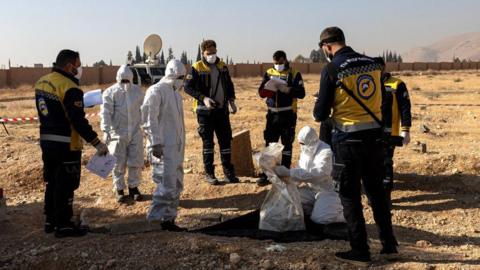Less than 10km (six miles) from the busy city centre of Damascus, in the north-western suburb of Adra, an arid stretch of land is sealed off with cement walls.
As you drive in, on the left-hand side, a team of rescuers from the White Helmets humanitarian organisation are seen searching for mass graves.
Over the past few days, videos have been posted online about mass graves where Bashar al-Assad's regime buried those tortured to death in Syria's notorious prisons.
In Adra, the White Helmets had found a small hole where several big white plastic bags were filled with remains of bodies.
A message simply reads: "Seven bodies, eighth grave, unknown."
The team was pulling out the remains, skulls and bones, which they found. DNA samples were collected. The remains were put in black body bags for documentation and further analysis.
Ismael Abdullah, one of the rescuers, says they are carrying a heavy burden on their shoulders.
"Thousands of people are missing. It is going to take time - a lot of it - to get anywhere near the truth about what happened to them," he says.
"Today, after receiving a call about possible mass grave here, we found on the ground the remains of seven civilians."
He adds that all the necessary procedures were carried out "so in the future we can identify those people who were killed". The team are among a small number who have been trained to document and collect forensic evidence.
